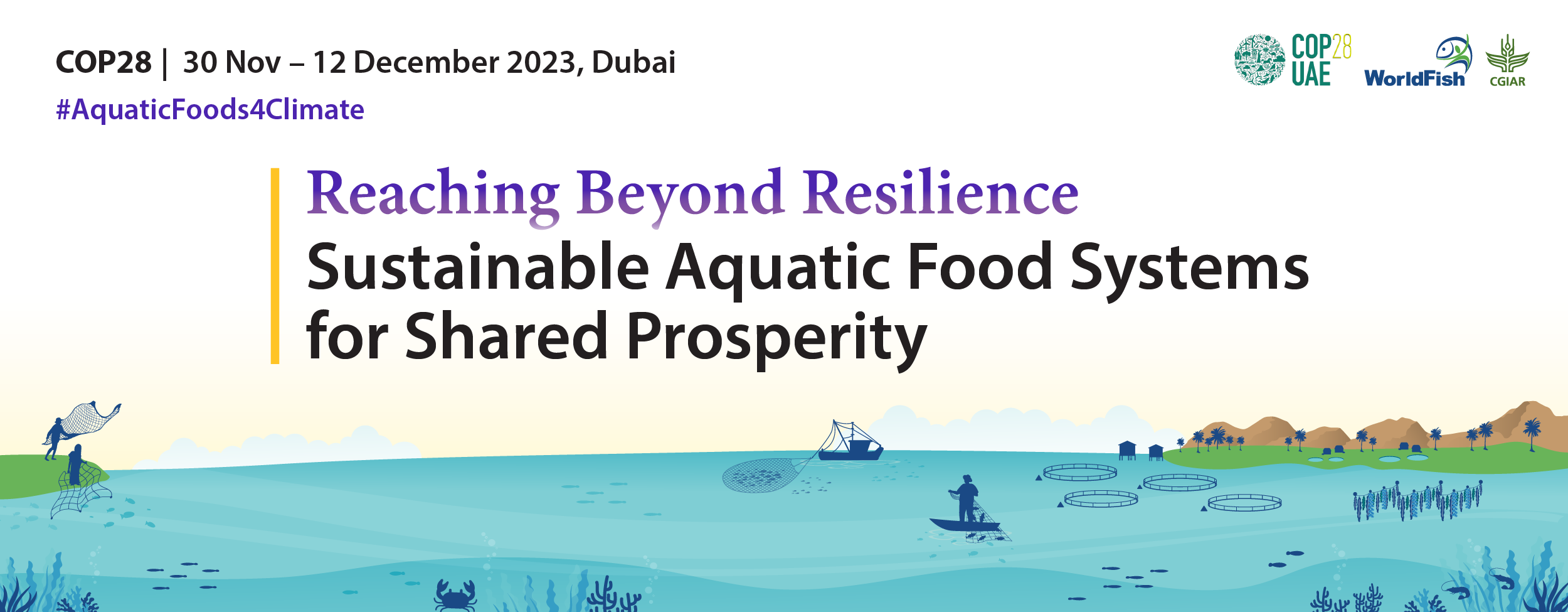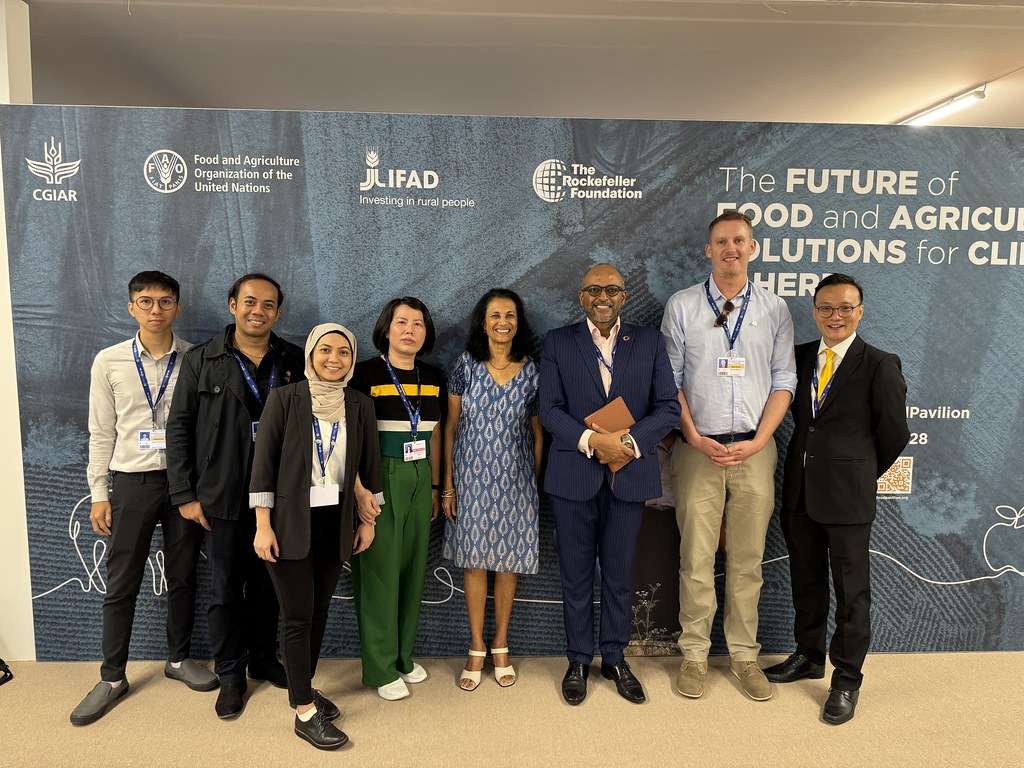
The escalating climate crisis is worsening food and nutrition insecurity, risking lives and livelihoods, and undoing hard-earned development gains.
But amidst the adversity lies opportunity. Aquatic food systems offer a powerful solution to both mitigate climate change and adapt our food systems to it.
Aquatic food systems are already central to the livelihoods and nourishment of billions globally, most of them in developing countries. Yet, they lack investment and inclusion in climate strategies. With adequate investment and policy, countries can unleash the potential they hold.
The time to act is now.
Sustainable and climate-resilient aquatic food systems can not only sustainably nourish the global population with reduced environmental footprint from food systems but unleash economic growth in an inclusive and equitable manner for shared prosperity.
Many aquatic foods produce a fraction of the CO2 emissions than traditional land-based agriculture does while providing crucial nutrition, especially in low- and middle-income countries.
Aquatic food systems nourish some 3.3 billion people around the world. They are an irreplaceable and largely affordable source of micronutrients, essential fatty acids and high-quality protein for vulnerable population in many of the world’s lower-income countries.
Aquatic food systems support livelihoods for around 600 million people, 90% of whom reside in low- and middle-income countries. Fish are also among the most traded food commodities in the world and one of the most valuable items of global trade, worth USD 151 billion in 2022.
The global demand for fish and seafood is projected to double by 2050, offering a significant opportunity to ride the wave of increased international trade and bolster local economies, particularly in subsistence farming communities across coastal and inland regions.
In Africa alone, aquatic food production could soar to USD 11.9 billion by 2030 and support more than double the jobs in the same timeframe if higher investments are made.
With advances in science, tools and new knowledge on fisheries management, aquatic food systems offer a key strategy to unleash sustainable economies and healthier diets for billions across the world amid the changing climate.
“Sustainable aquatic food systems could be the silver bullet for transforming food systems and leapfrogging several sustainable development goals – if done right.”
-Essam Yassin Mohammed, Director General WorldFish and CGIAR Senior Director of Aquatic Food Systems.
Our Vision
Our vision embodies a world of well-nourished individuals, thriving markets, enhanced livelihoods, and restored ecosystems, all underpinned by evidence-based tools, technologies, and practices to sustainably manage aquatic food systems.
Realizing this vision calls for a united effort to innovate and scale technologies that deliver impact.
Build Sustainable Livelihoods
Our Genetically Improved Farmed Tilapia (GIFT) is a climate-smart innovation, providing affordable nutritious food and increasing incomes, while also helping to reduce carbon footprint of food systems and enhancing resilience to climate shifts.
In Peskas, WorldFish has developed one of the most sophisticated data collection systems for small-scale fisheries to track fishing activities. Nationalised in Timor-Leste, this open-source online tool has highlighted previously unknown fishing areas, patterns, and productivity. New levels of data can more accurately monitor fish stocks so they can be maintained to safeguard livelihoods and food security.
Adapt to Climate Change
Centuries old rice-fish systems have been demonstrated to increase productivity and biodiversity for farming communities in Asia. These systems can ensure food and nutrition security with efficient use of increasingly scarce water resources. Investment in hilsa fish restoration has shown profound impacts, with a 9 to 11 times return on investment in Myanmar and Bangladesh, respectively, amounting to around $1.3 billion in annual revenue.
Through our Climate Information Services, timely and actionable climate information, over 100,000 fish farmers in Bangladesh can now not only stay a step ahead of climate events but adapt to them proactively.
Reduce Emissions
The in-pond raceway system (IPRS)for aquaculture reduces emissions by recycling water in a pond to create a water current and pumping out waste. This innovation has been successfully deployed in water-scarce regions, like Egypt, facilitatinga significant growth of fish production withlimited water resources to meet the nutrition demands of a growing population.
Innovations such as sustainable feed for aquaculture in Sub-Saharan Africa and seaweed farming in Bangladesh are opening doors to nutri-sensitive and nature-positive food production.
Improve Nutrition Access for All
Cultivating nutrient-dense fish is a strategic way to ensure that low-income communities have access to essential nutrients. In India, growing mola is integrated seamlessly with the government’s development and women empowerment programs, ensuring large-scale, sustainable impact.
In Timor-Leste, fish is making its way to school meals with ready access to tilapia through nation-wide scaling of GIFT aquaculture.
Riding the Wave: Opportunities for Climate Action
Our partnerships developed over three decades with countries in Africa, Asia and the Pacific has enabled scientific innovations, digital tools, knowledge, and evidence for policies, which can help us realize shared prosperity – healthy people and planet and thriving livelihoods for all.
For Donors and Investors
Support scaling out proven climate-smart aquatic food systems innovations, digital tools, and technologies, which can be transformative for countries’ food systems and economies. Co-developed by WorldFish and its partners and tested across 27 countries, they can catalyze sustainable and flourishing fisheries and aquaculture sectors in countries (see WorldFish’s Digital Innovations Catalog).
For Policy-Makers
Incorporateaquatic foods strategy in national climate action plans for mitigation and adaptation, including Nationally Determined Contributions (NDCs) and National Adaptation Plans (NAPs), to mobilize necessary financing and resources to put countries’ food systems on low-emissions pathway, while increasing food and nutrition security. A new study finds global food systems can achieve negative emissions by 2050 and identifies sustainable seafood harvesting as one of the promising technologies.
Adapt small-scale fishers to climate change, which is crucial and urgent to sustain livelihoods and food and nutrition needs for billions of people who depend on them, most of them in low- and middle-income countries. With declining catch from climate impact on water acidity and temperature and overfishing, WorldFish’s innovations such as Climate Information Services, short-duration fish culture, and integrated agri-aquaculture can build resilience for vulnerable rural and coastal communities.
For Countries, Development Agencies, and Implementing Partners
Invest in and partner to foster South-South collaboration, vital to accelerate country-led climate action for transforming food systems. Mutual learning and transfer of knowledge and appropriate technologies can fuel rapid adaptation and scaling out of locally tested technologies and practices (see a new 7-year initiative of WorldFish).
Join Us at COP28
At COP28, we aim to illustrate the critical role of aquatic food systems in climate discourse and convene stakeholders for partnering and steering climate action toward sustainable and resilient food systems that leverage aquatic food systems.
Your engagement is instrumental in navigating the tide toward a thriving global community.
For more information, contact Aniss Khalid at a.khalid@cgiar.org
For media enquiries, contact David Wardell at d.wardell@cgiar.org
Stay updated on aquatic foods research, outcomes and new knowledge : Subscribe to WorldFish Monthly
WorldFish Delegation at COP28
Senior Management and Scientists
- Essam Yassin Mohammed – WorldFish Director General
- Baba Yusuf AbuBakar – Chair, Board of Trustees
- Ann Flemming – Director, Programs and Impact
- Eddie Allison – Acting Director, Sustainable Aquatic Food Systems
- John Benzie – Acting Director, Sustainable Aquatic Biosciences
- Ahmed Nasr-Allah – Egypt Country Director
- Rodrigue Yossa – Senior Scientist, Aquatic Food Systems
- Peerzadi Rumana Hossain – Scientist, Climate Change
- Rahma Adam – Scientist, Gender and Social Inclusion
- Jie Su – Post-Doctoral Research Fellow, CGIAR Aquatic Foods Initiative
Communications & Knowledge Sharing
- Rajita Majumdar – Global Communications Lead
- Aniss Khalid – Events and Social Media, a.khalid@cgiar.org
- David Wardell – Media and Strategic Communications, d.wardell@cgiar.org
Resources
Stories of Change – 2022 WorldFish Annual Report
Press Release: WorldFish Calls for Small-Scale Fisheries’ Inclusion in COP28 Loss and Damage Fund
